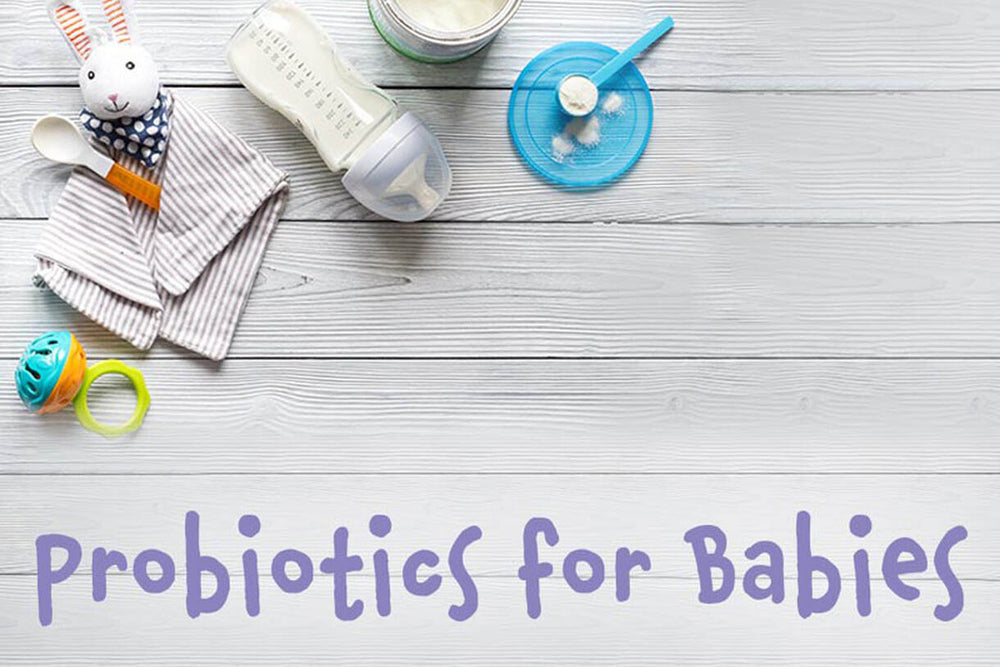
Probiotics for Babies: The Benefits of Good Bacteria for Healthy Digestion and Immune System Development
More and more parents are becoming aware of the role of the gut microbiota in their children’s health. Studies show that when there are imbalances in the microbiota – a complex system of cellular organisms that include bacteria, viruses, fungi, yeast and protozoa – we are at greater risk for diseases of the digestive tract and immunity disorders. A probiotic can help the microbiota rebound and strengthen it to support digestion and a healthy immune system.
But parents have questions. How young can children start taking probiotics? What do studies tell us? And can probiotics really make a difference?
A number of studies indicate probiotics are safe for young children, even infants. In a randomized, double-blinded, placebo-controlled trial in 2011, 50 exclusively breastfed colicky infants ages 2 to 16 weeks were given either a probiotic or a placebo for 21 days, and no adverse reactions were reported. In a much larger, two-year study in 2014 that followed 600 babies in Italy who started taking probiotics their first week of life, none of the babies had any adverse reactions. Both studies indicated that probiotics helped reduce the infants’ crying, and the latter study found that use of probiotics “decreased the reported incidence of inconsolable crying and regurgitation in the first three months of life.”
A more recent Finnish study published in 2018 found that babies delivered via caesarian sections could benefit from probiotics. Infants born by caesarian sections are at increased risk of developing metabolic, inflammatory and immunological diseases, according to the study. It also states that probiotic supplements, especially when combined with breast feeding, helped restore the babies’ normal microbiota composition.
The growing body of research pointing to the benefits of probiotics for babies is good news for parents. Maintaining a healthy gut provides crucial benefits including increased enzymes to digest dietary sugars, more efficient breakdown of complex carbs, and a strengthened immune system response. Probiotics can also facilitate the absorption of nutrients and increase digestive enzymes, and also stimulates the production of Immunoglobulin A (IgA), the primary antibody in our digestive tracts that defend against infections.
Parents need to educate themselves about some probiotic basics if they decide to give their babies supplements. For example, probiotics come as either bacteria-based or yeast-based strains, but yeast-based probiotics have larger cells and a protective membrane, making them more robust and resistant to a lot of antibiotics that can kill both good and bad bacteria.
Parents should also look for probiotics that are backed by scientific, clinical studies. Results of clinical studies, especially when there are multiple studies over numbers of years, will give you a better idea of how consistently a probiotic performs. Another consideration: look for supplemental probiotics that come in a sachet form, so they are easier to add to liquids, such as formula or juice. There are flavored powders that can be easily sprinkled on applesauce or other foods for young children.
Biocodex’s FlorastorBaby features Biocodex’s unique, active probiotic strain, Saccharomyces boulardii lyo CNCM I-745, made from the friendly yeast found naturally on the skin of lychee and mangosteen fruits. The strain is backed by more than 65 years of safe use and research worldwide. Infants can begin taking FlorastorBaby at two months.
Parents want to help their children flourish. Probiotic supplements can help give their babies a healthy start in life – even in their first few months – setting them on the path to healthy digestion and a strong immune system.